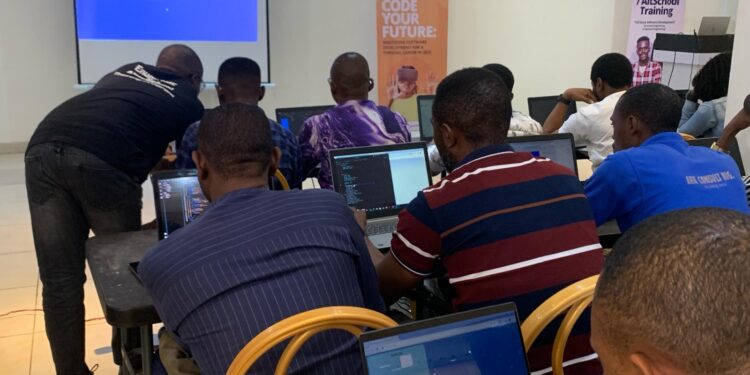The global outsourcing industry is booming, valued at over $260 billion in 2024 and expanding rapidly into Africa as companies seek new, cost-effective talent pools.
Countries like Kenya and Egypt have already carved out reputations as outsourcing destinations. Now, Enugu State is positioning itself to challenge that dominance with a bold new play: Project Turing.
Launched under the visionary leadership of Governor Peter Ndubuisi Mbah, Enugu Turing Tech Program is both an outsourcing workforce program and an infrastructure renewal drive, designed to create an ecosystem where Ndi-Enugu youths can earn global incomes without leaving home.
Competing with Africa’s BPO Leaders
For years, African countries like Egypt, Morocco, and Kenya have cornered the outsourcing market, attracting global firms to set up call centers, software hubs, and back-office facilities. Nigeria — despite its population size and talent base — has lagged behind, partly due to infrastructure bottlenecks and fragmented policies.
Enugu’s approach is different: a two-pronged strategy combining world-class human capital training with state-of-the-art outsourcing facilities.
At the heart of this push is Enugu Turing Tech Program, a 12-month Full Stack Software Engineering program run in partnership with Turing Tech, the Silicon Valley–backed platform that connects developers to international companies.
Graduates are guaranteed remote or hybrid jobs with starting salaries of $1,500 per month (~N2.4 million, or N27.36 million annually). Even in their first year, when deductions cover subsidized training and placement costs, participants still take home more than N12.8 million. From Year 2 onward, their earnings rise to over N27 million annually.
“Enugu Turing Tech Program is not just another training program; it is a full ecosystem that combines world-class skills development, guaranteed job placement, and outsourcing infrastructure here in Enugu. For the first time, Ndi-Enugu youths can earn in dollars without leaving home, proving that talent export does not have to mean brain drain. This model will change lives, attract foreign exchange, and position Enugu as Nigeria’s outsourcing capital.” said Arinze Chilo-Offiah, Special Adviser on Digital Economy & MSMEs and Director-General of the Enugu SME Center.
Building Enugu’s Outsourcing Facilities
Alongside workforce training, Enugu State is renovating underutilized government-owned buildings into BPO hubs — physical facilities where international firms can plug directly into local talent. These centers will host customer service, back-office operations, and IT-enabled outsourcing, with thousands of job seats planned in the first rollout.
This infrastructure-first approach sets Enugu apart from most Nigerian states, which often focus narrowly on skills training without building the business environment to sustain job creation.
A Diaspora-Led Investment Model
Nigeria’s diaspora remits over $20 billion annually, largely to support families. Enugu is reframing this into a diaspora investment opportunity — enabling families, associations, and private sector firms to sponsor trainees who will, in turn, secure high-paying jobs.
This model mirrors successful approaches in Rwanda and Ghana, where diaspora and private funding have underwritten training and outsourcing expansion. For Enugu, it creates a self-sustaining loop of brain gain: youths earn in dollars, spend locally, and reduce the economic pressure to migrate.
Governor Mbah’s Vision
Governor Peter Mbah emphasized that outsourcing is central to Enugu’s broader economic growth agenda:
“Our vision is clear — to grow Enugu’s economy from $4.4 billion to $30 billion. Outsourcing is one of the fastest ways to achieve that because it combines human capital development with foreign exchange inflows. With Enugu Turing Tech Program and our BPO investments, we are positioning Enugu as Nigeria’s outsourcing capital, ensuring our young people can compete globally while living and thriving here at home.”
A Defining Moment for Nigeria’s Digital Economy
Enugu’s Project Turing could mark a turning point in Nigeria’s positioning within the global outsourcing market. If successful, it would shift Nigeria from a remittance-dependent economy to a forex-earning outsourcing destination, creating ripple effects across the Southeast and beyond.
By combining training, infrastructure, diaspora funding, and international partnerships, Enugu is not just catching up with Africa’s outsourcing leaders — it is building a new model for sustainable digital growth.
Applications are currently open at www.enugusme.en.gov.ng/ettp.













